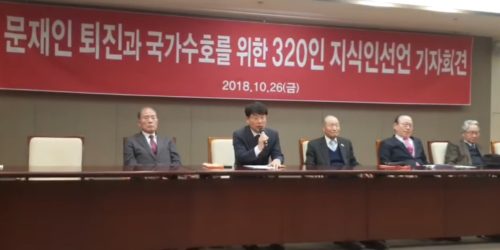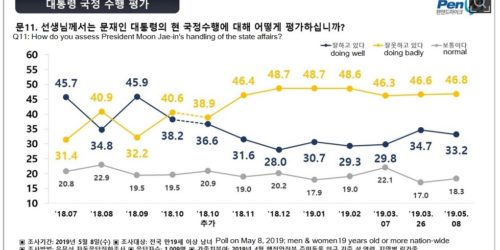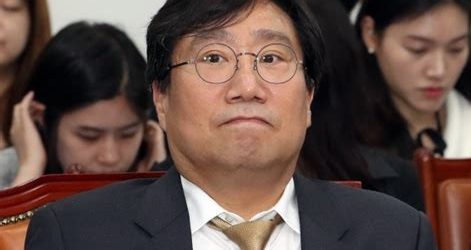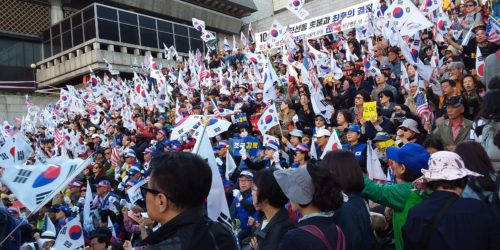Marketer-turned Assemblywoman Sohn Hye-won’s Property Scandal & Moon Jae-in’s “Deobureo Spirit”
2019-2-7, Tara O
National Assemblywoman Sohn Hye-won recently cut ties with the ruling party, Deobureo Minju Party, after she was accused of real estate speculation. As more facts are uncovered, such as her ties to South Korea’s First Lady and Sohn’s father receiving a “person of merit” designation despite his history as someone who opposed the emergence of the Republic of Korea, more questions about Sohn’s improprieties and her role within her party are emerging. Even though Sohn left the Deoburro Minju party as a result of these scandals, it raises questions about the Moon administration and the Deoburro Minju Party’s image as a power claiming to be non-“jeokpae” (non-“deep-rooted evil” or non-corrupt) and ruling with kindness.
Sohn Hye-won
Sohn Hye-won (손혜원) Property Scandal
The allegation is that Sohn Hye-won is guilty of corruption for using her position as a member of the National Assembly’s Culture and Tourism Committee and privileged insider information to purchase houses, buildings and land, knowing that they would appreciate in value after her committee designated them to be in cultural zone. The initial story by SBS (one of three largest, non-cable broadcasters) was that nine real estate properties were purchased in Mokpo City in South Jeolla Province in the names of Sohn Hye-won’s relatives and associates. Since then the number has risen to twenty-five properties in Mokpo alone, and those properties in “cultural zones,” (designated in August 2018) are said to have increased in value two to three times. Many of the properties in the cultural zone were bought between March and September 2017. Of those, fifteen are owned by Crosspoint Cultural Foundation (크로스포인트문화재단), whose chairman is Sohn Hye-won’s husband Jeong Geon-hae (정건해).
Figure 1 shows that three properties are under Sohn So-young, Sohn Hye-won’s niece, two properties are under three people, including Sohn Jang-Hoon (nephew) and the daughter of Sohn Hye-won’s aide, one property is under Kim Sang-min (김상민), the husband of the aide, and 14 properties are under Sohn Hye-won’s husband’s foundation, Crosspoint Cultural Foundation. The numbers have gone up since the story broke to a total of 25 properties, with 15 properties under the Crosspoint Cultural Foundation .
Sohn’s supporters ask what is wrong with her buying properties and making a profit? Buying properties and making profit is normal under free market capitalism. What is wrong, and illegal, is benefiting from privileged insider information, the abuse of authority, and using false names to purchase properties.
1. Sohn Hye-won is on the National Assembly’s Culture and Tourism Committee (국회 문화체육관광위) as the ruling party’s assistant administrator. As such, she had access to information about which areas would be designated as “cultural heritage” zones. She also has influence on which areas may receive the designation. Such a designation usually increases the value of properties in the zone. Using insider knowledge to gain in itself is illegal, but it also is an abuse of her position and authority.
2. It was confirmed on January 17, 2019 that 110 billion won ($99 million) of the national budget was allocated for investment in Mokpo’s Modern Historical and Cultural Area.
The national budget to be allocated to the Mokpo modern historical and cultural area in South Jeolla Province is estimated to reach 110 billion won on July 17. The Ministry of Land, Transport and Maritime Affairs on December 2017 decided to invest 59.3 billion won ($52.8 million) over five years until 2022 in Mokpo City for the so-called ‘Urban Renaissance New Deal Project,’ (도시재생뉴딜사업) including 32.7 billion won ($29.1 million) in the ‘1897 Open Port Cultural Street’ (1897 개항문화거리) in Manho District, and 26.6 billion won ($23.7 million) in “Barley Plaza” (보리마당) in Yoodal District. In addition, the Cultural Heritage Administration plans to spend 50 billion won ($44.5 million) for the ‘Revitalization of the Modern Cultural History Space’ (근대문화역사공간 활성화 사업) over five years from 2019, and a total of 109.3 billion won of the nation’s taxpayers money will be put into the area.
— “110 billion in Tax Payers’ Money to go into ‘Sohn Hye-won Town’,” Monthly Chosun, 2019.1.18
Is there a link between the cultural designation of the area and the properties that are located in the zone? The majority of the properties were bought before the cultural zone designation, which was on August 8, 2018.
3. Using another person’s name to buy property, open a bank account, or otherwise conduct transactions in another person’s name are illegal in South Korea. It is even worse when a lawmaker breaks the law.
Regarding the property that is in the name of Sohn Hye-won’s nephew (her younger brother’s son), the nephew did not even know there was a property under his name, according to the Kakaotalk chat between him and his mother. It stated “I invested in a property? A mere 23 year old conscript in the military? I don’t know anything about real estate. I supposedly invested in real estate? Me? It was given to me?” He was serving in the military at that time and only found out when the news broke.
The brother Sohn Hyeon (손현, the 23-year olds’ father) wrote on line that his older sister Sohn Hye-won instructed his ex-wife to bring their son’s seal (the seal can be used in lieu of a signature in South Korea for legal transactions) to buy a guest house in Mokpo. He said his ex-wife told him it was not a situation in which she could refuse and she did not even know the details at that time. In June 2017, 30,000,000 won ($27,000) was deposited into the account of his son [the guest house is under his and two other names], and his ex-wife transferred it 10 minutes after the fund was deposited. The same transfers occurred three months later in the amount of 42,000,000 won ($37,000). In February 2018, Sohn Hye-won sent additional 7,200,000 won ($6,400), and his ex-wife used the funds to pay taxes on the property as instructed by Sohn Hye-won.
We never paid for maintenance or remodeling…because it wasn’t ours…We haven’t even seen the title…we don’t know who operates it [the guest house]…Do you really think it’s my son’s? Who gives a house away by taking out a loan? She never gave even 1,000 won ($0.89) during holidays. Do you think such a woman would give away a house?
–Sohn Hyeon, brother of Sohn Hye-won
While Sohn said she does not know who wrote the online comment, her brother appeared on PennMike for an interview, confirming what he wrote it. He described his sister as a person that everyone in the family is afraid of. (5:39)
Moon Jae-in/Kim Jung sook’s (김정숙) house sold to Sohn’s former assistant
While the property speculation, insider information, and the abuse of authority allegations swirl, additional information has since emerged. One of the houses where Moon Jae-in and his wife Kim Jung-sook lived was a house in Hong-eun-dong in Seoul, where they lived for 1 year and 5 months prior to going to the Blue House. It was under Kim Jung-sook’s name. It was revealed that the house was purchased by the current presidential administrator Kim Jae-joon (김재준) at the Blue House, who used to work for Sohn Hye-won as her assistant at the National Assembly until December 2016. Prior to working for Sohn, Kim Jae-joon worked for then National Assemblyman Moon Jae-in during the 19th National Assembly.
First Lady Kim Jung-sook bought the house on December 17, 2015 in her name for 285,000,000 won ($255,000) and administrator Kim Jae-joon bought the house on October 13, 2017 for 340,000,000 won ($304,000), after borrowing 165,000,000 won ($147,000), the maximum amount that could be borrowed from the bank.
Sohn Hye-won and Kim Jung-sook have known each other for about 50 years, having attended the same school, Sookmyeong Women’s High School (as well as the same middle school). High school alumni are an important network in South Korea; many close personal connections in South Korea are determined by with whom a person went to high school. On May 10, 2017, the inauguration day for president Moon Jae-in, his wife Kim Jung-sook attended a Sookmyung Women’s High School alumni gathering.
National Assemblywoman Na Kyung-won (나경원), Liberty Korea Party, called this scandal “ not just about whether it’s real estate speculation or not, but about ultimate political power corruption,” saying “National Assemblywoman Sohn is not a mere first-term representative. She is First Lady Kim Jung-sook’s fellow Sookmyung Women’s High School alum, and I recall the first walk was [for Sohn Hye-won] to go with [Kim Jung-sook] to the Sookmyung Women’s High School alumni gathering. [Sohn] entered politics initially as a public relations specialist, and that was after the First Lady Kim requested she enter the ruling party and help out.” The Blue House expressed displeasure when its spokesperson said “there is decorum and line to be maintained” [implying that they don’t feel it proper for National Assemblywoman Na to call such things out].
Father with communist activism background designated as a “meritorious person” after 6 rejections
Yet more controversy arises. At the 73rd anniversary of national independence event at the National Museum at Yongsan, Seoul on August 15, 2017, Moon Jae-in presented an award to Sohn Hye-won’s mother Kim Kyung-hee (김경희) on behalf of Kim’s husband and Sohn’s father Sohn Yong-woo (손용우). The award was the National Medal (5th level) of the Order of Merit for National Foundation, (건국훈장 애족장), an award for “clear meritorious deeds towards the national foundation of South Korea or clear contribution toward building a solid national foundation for the country.”
This designation not only offers a recognition and national gratitude, but also allows Sohn Yong-woo’s wife to receive 1,518,000 won (~$1,400) per month plus other benefits from the government. It also provides 1,483,000 won ($1,325) per person per month and other benefits, such as priority in housing, education, and government jobs, to the family members other than the spouse, which includes Sohn Hye-won and her five siblings plus all of their respective children (Sohn Yong-woo’s children and grandchildren). [By Comparison, the spouse or the families of South Koreans who are Korean War veterans do not receive monthly payments; only the veteran over 65 years of age, and the amount is 300,000 won ($268) per month.]
Sohn Hye-won had applied for the meritorious person status for her father (Sohn Yong-woo) with the Ministry of Patriots and Veterans six times during 1982-2007, but it was rejected each time. The problem was that Sohn Yong-woo served as a member of the Communist Youth League, Seoul branch of the Korea Workers’ Party (Communist Party of Korea).
The Soviet-led Communist International (COMINTERN) approved the nascent communist party in Korea in 1926. During the Japanese occupation period (1910-45), there was activism against the Japanese, but according to Jeong Gyoo-jae of PennMike, the activities of the communist party during that time was not so much for national foundation (of South Korea and its system), but toward the goals of Communist International of bringing about global communism. (46:50)
After Korea’s independence, Terentii Shtykov, political adviser to the People’s Committee and the commander of the Soviet Union’s 1945-48 military occupation force in Korea north of the 38th parallel (Kim Il Sung served under Shtykov’s command during the war), instructed the formation of the Korea Workers’ Party-South / Namjoseon Nodongdang or Namnodang for short (남조선노동당 or 남로당, south of 38th parallel led by Pak Hon-yong 박헌영) and Korea Workers’ Party-North (북조선노동당, north of the 38th parallel led by Kim Il-sung 김일성). (45:00) In 1949, the two merged to form the Workers’ Party of Korea (조선노동당), with Kim Il Sung as its chairman. (Kim Il-sung later purged Pak Hon-yong)
The Korea Workers’ Party, South Korea branch, or Namnodang (남로당) used violence and terror–including the 4.3 Jeju rebellion, Daegu rebellion, and Yeosu-Suncheon rebellion–to oppose the creation of the Republic of Korea (South Korea) by blocking the May 10, 1948 election (the first-ever election in Korea’s history, under the UN supervision). (46:00)
Thus it was not a surprise that Sohn Hye-won’s application for her father to be recognized as a “Meritorious Person” was rejected six times.
This situation changed, however, after Sohn and the Minister of Patriots and Veterans Pi Woo-jin (피우진) met. After Sohn became a first-term representative at the National Assembly in June 2017, Sohn suggested a meeting with Pi, and they met in February 2018 at the National Assembly’s meeting hall to discuss the issue of Sohn’s father and the “Meritorious Person” issue. Soon, the regulations changed, and Sohn’s father Sohn Young-woo received the Meritorious Person designation. When Sohn Hye-won told her older brother to apply again, her other siblings were doubtful, because their father was rejected six times already, but the older brother applied again; it was via a phone call.
National Assemblywoman Lee Un-ju (이언주) Bareun Mirae Party, criticized granting such status to Sohn Hye-won’s father Sohn Yong-woo, stating that Namnodang members were “traitors who tried to overthrow the free Republic of Korea” and demanded “Representative Sohn and Patriots and Veterans Minister Pi Woo-jin apologize to the citizens and cancel the posthumous award.”
Korea Mother of Pearl Museum (나전칠기박물관)
About 150 people attended the opening of Sohn Hye-won’s Korea Mother of Pearl Museum in Itaewon on November 1, 2014. It is located in the basement of the Crosspoint Gallery, which is on the first floor. Although it is named a “museum,” it is not legally considered a museum, because it does not meet the requirements for a museum, according to the Ministry of Culture and Sports.
Sohn has received a 1.1 billion won ($983,000) loan related to this “museum.” Sohn said she obtained the loan in order to move the museum and sell the building, and repay the loan with the proceeds of the building sale. Sohn’s representative said “of the 1.1 billion [$983,000] won loan, she donated 710 million won [$634,000] to ‘Crosspoint Foundation’ where her husband is the chairman, and the remaining amount (390 million won or $348,000) was used to repay the money that Sohn had previously borrowed from multiple financial institutions.” Further, the spokesperson said among Sohn’s officially registered assets, “all of the cash and stocks are the property of Sohn’s husband, the foundation’s CEO.”
Sohn Hye-won said on a CBS radio show on January 16, 1919 “all the buildings and assets in the name of the [Crosspoint] foundation are not something that I can get back. I can’t sell them. How can this be speculation?” This is not the position she took two years ago, when Sohn inferred that foundations (Mir and K Sports) were used for nefarious purposes. In January 2017, Sohn said “In the long run, I think that in order to get money from the chaebols throughout the term of President Park Geun-hye, she’d have to make something like a foundation…” at a hearing.
A Marketing Guru Sohn, Rebranded Deobureo Minju Party, Moon’s Idolization of North Korean agent
In 1986, Sohn Hye-won was a founding member of Crosspoint company, which is an identity and design company, and in 1990, she bought Crosspoint and became its CEO. Sohn’s Crosspoint created brands such as LG Tromm washer, Angel-in-Us coffee shop chain, and the Hillstate condo brands, all of which were successful.
Sohn’s firm was responsible for the top Soju brands in South Korea as well. Soju is perhaps the most popular alcohol drink in South Korea. The two brands she created are Cheo-eum-cheo-reom (처음처럼, “like the first time”) by Lotte Chilsung and Cham-i-seul (참이슬 “true dew”) (formerly Jinro Soju), which are wildly popular in South Korea.
In 2015, Moon Jae-in asked her to be the Public Relations Committee chair for his party, which at that time was called New Politics Democratic Union (Sae Jeongchi Minju Yeonhap, 새정치민주연합). She rebranded the party’s name as “Deobureo Minju Party” (더불어민주당), adding “Deobureo” (더불어) to the existing “Minju.” It was the fourth on the list of six potential names, but Sohn pushed it through.
“Deobureo,” means “together” or “with,” and it is not a common term used for such expression. The term more frequently used is “gatchi” or “hamkke.”
Both “Cheo-eum-cheo-reom” and “Deobureo” came from poem titles written by Shin Young-bok (신영복), who spent 20 years in jail for his role in the Unification Revolution Party (Tonghakdang 통학당), an underground party in South Korea that was controlled by North Korea’s Korea Workers’ Party. Sohn is not the only one to admire Shin Young-bok; President Moon Jae-in publicly stated he “admires Shin Young-bok” at the 2018 Pyeongchang Winter Olympics reception and displayed Shin’s calligraphy on the wall of the reception room. Former labor activist who is now in Liberty Korea Party, Kim Moon-soo, said “Shin Young-bok is avowedly a North Korean agent” and “president Moon Jae-in really admires Kim Il-sung’s ideology.
Moon Jae-in displayed his admiration for Shin Young-bok when he visited Shin’s grave on January 17, 2016 when Shin died. Moon stated “Mr. (teacher–an honorific) Shin Young-bok gave me his ‘Cheo-eum-cheo-reom’ (poem)’ and I’ll always cherish and carry out your (Shin’s) ‘Deobureo’ spirit, coexistence, and solidarity spirit.”
“Deobureo” is not only in Shin Young-bok’s poem, but also in the title of Kim Il-sung’s biography, With the Century (세기와 더불어)
Reactions
When National Assemblyman Kwak Sang-do (곽상도), Liberty Korea Party, revealed the information about Sohn’s real estate transactions, Sohn was angered and called Kwak a “devil wearing a human mask,” and a Joongang Ilbo article on the topic a “cunning article” (2:52) She also got upset at SBS, which was the first to break the story. Even Park Jie-won (박지원), Democracy and Peace Party leader (and People’s Party leader until its dissolution in February 2018), who initially defended her, turned around completely and started to attack her. He called her the “icon of property speculation” and she called him the “icon of betrayal.” These occurrences are odd because Joongang Ilbo, SBS, and Park Ji-won have usually supported the Deobureo Minju Party and its members. (3:14
Sohn held a press conference on January 23 in Mokpo and said “I’ve never took actions that benefit me personally. From the beginning, the intent wasn’t to keep them [the properties], but to give them away.”
KBS, the public broadcasting company that has become a mouthpiece for the Moon administration after it took took over KBS with the help of the militant National Union of Media Workers (NUMW) under the Korean Confederation of Trade Unions, has not covered this issue much, and when it did cover it, it was to support Sohn. KBS tried to say the area does not seem to be developing and there does not seem to be much change in the area (to warrant an increase in the value). OhMyNews, a left-leaning newspaper, also emphasized the same theme by covering how KBS and Mokpo MBC (also taken over the same way as KBS, see here) criticized SBS’s exposé of Sohn Hye-won.
Sohn Hye-won, held a press conference at the National Assembly with the Deouburreo Minju Party leader Song Young-Pyo (송영표) at her side on January 20, 2019. When Sohn placed her hand on the party leader Song’s shoulder to encourage him, some questioned who is the real power in her party. After announcing her departure from the Deuburreo Minju Party (but still keeping her national assembly seat), she threatened to sue journalists for “fake news.” Sohn emphasized “With the dissemination of false information, we will capture all of the articles that have been written so far and the associated journalists, and sue about 200 cases early next week.”
Former Gyeonggi Province Governor Kim Moon-soo, Liberty Korea Party, criticized Sohn for not repenting, but instead, bringing the party leader Hong Young-pyo for support and threatening to sue the media.
National Assemblywoman Lee Un-ju stated “Whether she is President Moon Jae-in’s close associate or the real power behind Deobureo Minju Party, just because they now have power, [Sohn] abused her power, not only for her personal economic gain, but to pressure [Ministry of Patriots and Veterans] to get the national meritorious person recognition for a traitor who collaborated with North Korean invaders in shedding the blood of our parents.
Sohn’s attack on the whistleblower Shin Jae-Min
Just before Sohn’s recent scandal was exposed, Sohn’s criticism of Shin Jae-min (신재민), a young civil servant who, in mid-December 2018, revealed corruption at the Blue House, including the Blue House forcing issuance of $3.6 billion in government bonds, was seen as mean-spirited and distasteful. She wrote a diatribe against Shin on her Facebook starting with “[Shin’s] babbling skill is despicable.” She took it down after the police found Shin, who the police said disappeared after leaving a suicide note. Shin, who said he attended candlelight protests, lamented about all the criticism and pressure he received from certain segments of society (the Blue House, Deobureo Minju Party, their supporters) for doing what he thought was the right thing to do. For more on Shin’s exposé, see here and here
President Moon Jae-in and his Deobureo Minju Party have come to power, citing the “candlelight revolution.” They have portrayed their political opponents as “jeokpae” (deep rooted evil/ accumulated ills) and jailed, harassed, and bankrupted their political opponents, while portraying themselves as clean, refreshing, and kind. Sohn Hye-won’s case is but one example of how they are not immune from corruption, abuse of authority, and unkindness. It also shows their reverence for those with ideological ties to North Korea’s Kim family regime.





